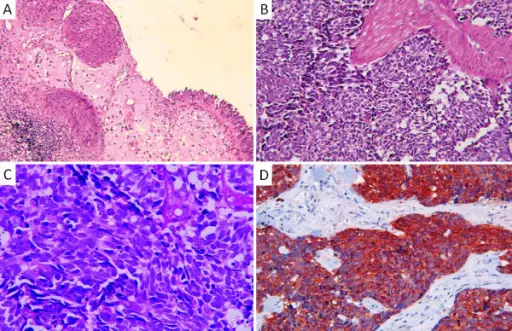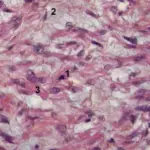Small cell carcinoma of the bladder is a very rare, poorly differentiated neuroendocrine epithelial bladder tumor characterized clinically by hematuria and/or dysuria and a highly aggressive course.
What is the Pathology of Small Cell Carcinoma of the Bladder?
The pathology of small cell carcinoma of the bladder is:
-Etiology: The etiology of the disease is unknown.
-Genes involved: Overexpression of DLL3 mRNA and protein.
-Pathogenesis: The sequence of events that lead to small cell carcinoma of the bladder is from a multipotent stem cell.
-Morphology: The morphology associated with small cell carcinoma of the bladder shows unifocal mass centered in the renal pelvis, usually invading perinephric adipose tissue, composed of small cells.
-Histology: The histology associated with small cell carcinoma of the bladder shows diffuse growth of small cells with nuclear molding, minimal cytoplasm, indistinct nucleoli, high mitotic activity, and apoptotic bodies.
How does the Small Cell Carcinoma of the Bladder Present?
Patients with small cell carcinoma of the bladder typically affect males between 59 to 65 years of age. The symptoms, features, and clinical findings associated with small cell carcinoma of the bladder include gross hematuria with dysuria as the second most common symptom.
How is Small Cell Carcinoma of the Bladder Diagnosed?
The small cell carcinoma of the bladder is diagnosed by histopathological data and cystoscopy.
How is Small Cell Carcinoma of the Bladder Treated?
The small cell carcinoma of the bladder is treated with surgical excision.
What is the Prognosis of Small Cell Carcinoma of the Bladder?
The prognosis of small cell carcinoma of the bladder is poor mainly in the case of pure small cell carcinoma.



